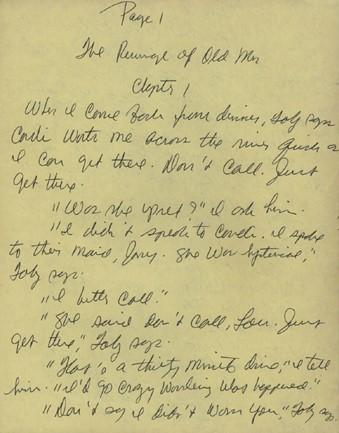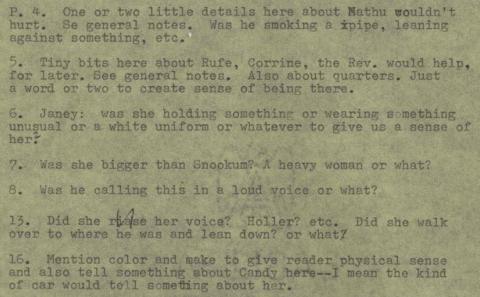Treasures in the Ernest J. Gaines Collection by Andrie Morris
To what extent is it possible to get inside the creative mind of a writer? No single source can unequivocally take us to the core of the literary imagination that draws us to it. But if we take as a helpful starting point materials once held in the writer’s possession and gifted to a repository of their choosing, we will feel closer to an answer.
I knew that the collection at the Ernest J Gaines Center would be vital to my effort to begin a critical conversation about A Gathering of Old Men. The novel was the focus of a dissertation I submitted as part of my M.Phil studies in American Literature at the University of Cambridge. I was never entirely happy that my project would be shaped solely by critical evaluations – either my own or that of other literary critics. To take my own analysis beyond the ordinary, I needed insight into Gaines’ writing process.
The Center’s archivist gave me access to Gaines’ early handwritten draft of the first chapter of Gathering. It is a unique primary resource that rounds out the author as an artist. We see that he writes with fervor; his pen barely keeping up with the pace of his thoughts, so keen is he to set down his narrative. And in his storytelling, it is his renderings of dialogue that flow most freely. Gaines’ original draft shows a dedication to depicting the people and places that form his vision of Louisiana.

The Center’s printed materials also include comments from Gaines’ literary agent, Dorothea Oppenheimer. A skilled editor, Oppenheimer steered Gaines towards nuanced expression of the kind of culturally complex communities that he well understood. She exerts a gently chiding influence on his initial ideas that encourages him to fine-tune the detail of characters he holds in his mind’s eye.

When Gaines is in danger of trivialising Beau’s murder, Oppenheimer reminds him to “be careful, there’s a dead body lying there.” It is as if she and Gaines are united in an endeavor to reinforce the integrity of the folk culture to which Gaines writes back. The corpse is ‘entombed’ by thick teeming weeds; weeds flank both sides of the road leading to the quarters where blacks have lived and worked since the time of slavery. Weeds, symbolic of the economic and social constraints Gaines’ old men have battled against all their lives, must be crawled through for corrective justice to be realized. As the men take on this responsibility, they finally begin to break the power of the land’s hold over their lives.
I was re-reading Gathering during the early summer of 2020, when press coverage of George Floyd’s death gave fresh impetus to Black Lives Matter protests in the US and around the world. At that time, in my life as well as in Gaines’ art, diverse communities were united in a continued struggle against antiblack brutality and injustice. Gaines’ personal papers guided me towards closer scrutiny of the pernicious structures that sustain racial inequality. Seeing his notes made me feel that I, as a black working-class woman from south London, could relate to the realities in his fictional view of the South.
When the global coronavirus pandemic threatened to scupper my research plans and delay my work schedule, the Center’s archivist continued to support my needs. She was generous with her knowledge and time. Once I gave her a steer on what I was interested in, she was ready to answer my questions via video call. She searched the collection to find what I might need, made book recommendations and sent me links to relevant scholarly articles. Through exposure to a variety of perspectives, I was able to pull together the strands of my thematic interests and determine how to position what I wanted to say within debates about Gaines’ work.
As an author, Gaines knew that research fed his literary imagination. And as a scholar, he knew that it can be a battle to organize what is unearthed. Occasionally, as I prepare to enter one of Oxford’s Bodleian Libraries to undertake my own research, the words of one of Gaines’ old men suddenly comes into my mind: “Heads up and backs straight,” says Clatoo before leading his friends into the unknown. “We going in like soldiers, not like tramps. All right?”
Andrie Morris is a doctoral candidate in English Literature at the University of Oxford.